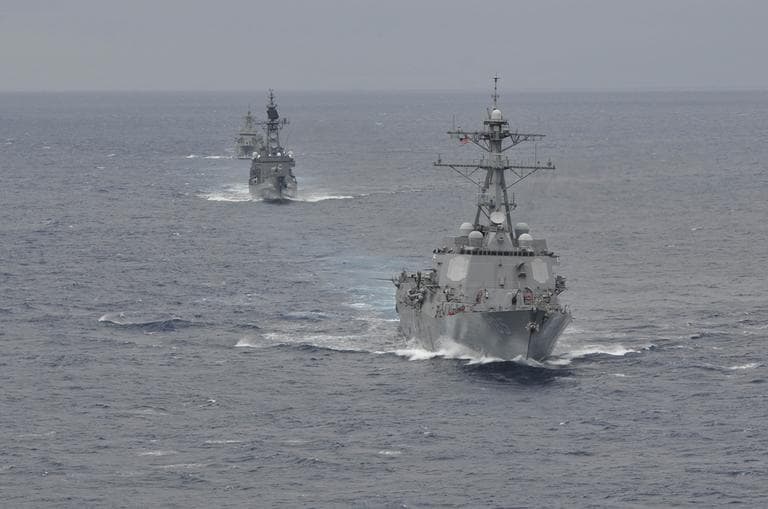Advertisement
Congress Takes Aim At Green Pentagon Programs
ResumeThe Pentagon is the world’s largest consumer of fossil fuel – and it wants to go green. But congress is pushing to torpedo the whole idea. Stay on oil. We’ll look at the military and big oil.

The U.S. military is the country’s number one energy consumer. All those warships, planes, Humvees and bases drink a lot of oil. The Pentagon has made a loud, high priority of wanting to get to alternative fuels, green fuels, as an issue of national security. Safer supplies. Less volatile prices.
And a candid admission that fossil fuels, long-term, are themselves a security threat. Now, Congress is moving to throw the brakes on the Pentagon’s go-green campaign. Republicans, Texas oil-country reps, coal-state Democrats saying no.
This hour, On Point: torpedoing the Pentagon’s move to green.
-Tom Ashbrook
Guests
Noah Shachtman, editor of Wired magazine's national security blog, Danger Room and a nonresident fellow at the Brookings Institution. You can find his reporting on the fight over Pentagon's biofuel efforts here.
Phyllis Cuttino, director of the Pew Charitable Turst's Clean Energy Program and director of the Project on National Security, Energy, and Climate, which recently issued a major report on the Pentagon and green energy.
Dennis McGinn, a retired vice admiral, he's the president of the American Council on Renewable Energy.
Christopher Preble, vice president for defense and foreign policy studies at the Cato Institute.
C Segment: Speaker to Wellesley High Grads — "You're Not Special."
Swellesley Report: "And now you’ve conquered high school. And, indisputably, here we all have gathered for you, the pride and joy of this fine community, the first to emerge from that magnificent new building. But do not get the idea you’re anything special. Because you’re not."
From Tom's Reading List
Boston Globe "When a bunch of Birkenstock-wearing environmentalists clamor for cleaner energy alternatives — biofuels, solar, or wind — it’s not entirely a surprise when Senate Republicans scoff in response. But it is odd that when military leaders make the same recommendation, those same legislators don’t even budge. Much worse, they have now prohibited Big Green from going green."
Wall Street Journal "Though some services have begun experimenting in recent years with their own energy-saving efforts—the Navy's Blue Angels aerobatics team recently made its first flight using biofuels—the new plan is the first effort to revamp energy use across the Department of Defense."
CNN "The Defense Department has a grand vision for the U.S. military's energy future, including "green"-powered fleets, jets and trucks. But members of Congress are hung up on the dollar signs that come with going green."
Time "And while it might be nice to develop alternative sources of fuels that can be deployed at the front lines and with the troops, instead of depending on a long fossil-fueled supply line, the RAND study argues that such a transformation isn’t feasible"
Video: The Pentagon And Fuel
Check out this video from the Pew Project on National Security, Energy, and Climate about the Pentagon's use of fossil fuels.
This program aired on June 12, 2012.

